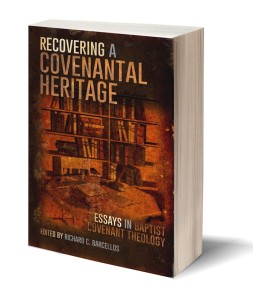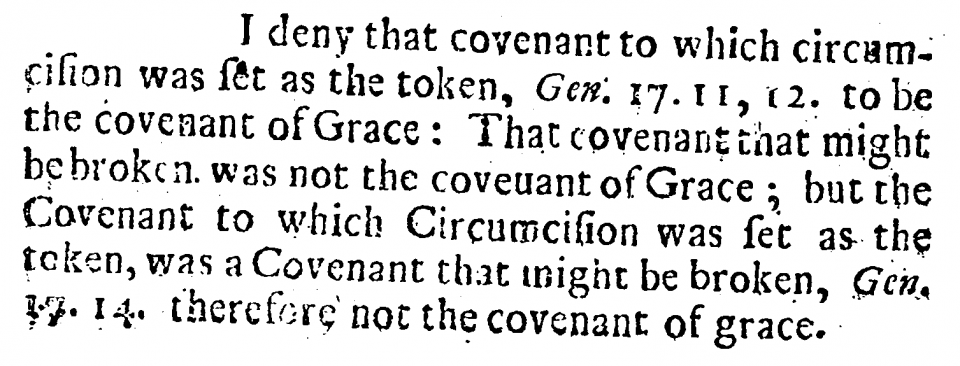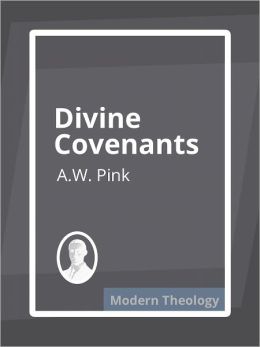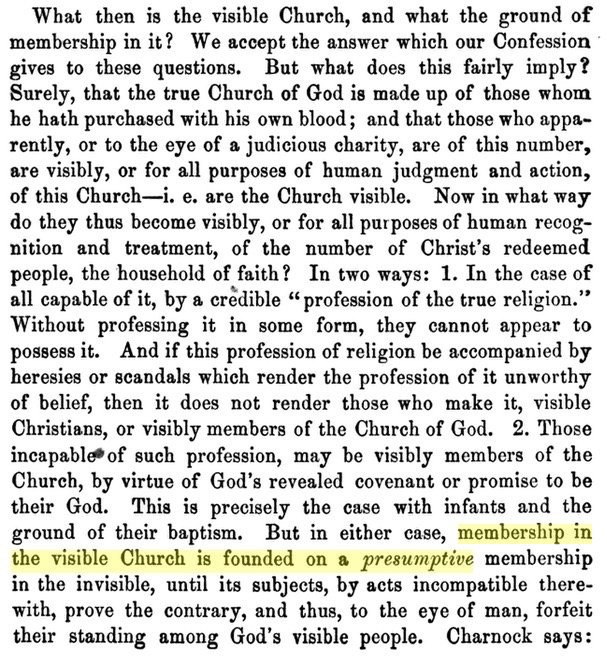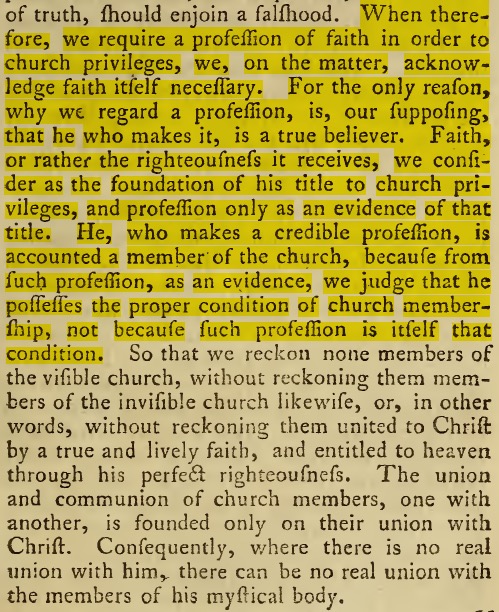historical
Augustine: Proto-1689 Federalist
On 06, Apr 2015 | In Resources | By Brandon Adams
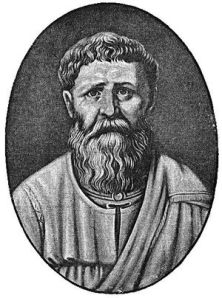
Please note: There is a difference between covenant theology and sacramentology. The two are very related, but they are distinct. 1689 Federalism is a particular view of covenant theology. It logically entails a particular sacramentology, but the two are distinct. This article is not suggesting Augustine was a baptist. This article is demonstrating the substantial agreement between Augustine’s covenant theology and 1689 Federalism.
Augustine believed in the Adamic Covenant of Works: Adam was a federal and natural representative of all men. He was working towards the reward of immutability. All his descendants broke the covenant when he sinned, imputing original sin to all of them. In this regard, he was in agreement with both 1689 Federalism and Westminster Federalism.
However, the rest of his covenant theology agreed with 1689 Federalism, in contrast to Westminster Federalism. Read more…
John Owen, Baptism, and the Baptists (Crawford Gribben)
March 20, 2015: Dr. Crawford Gribben, @GribbenC (Professor of Early Modern British History at Queen’s University Belfast and author of the recently published academic biography John Owen and English Puritanism: Experiences of Defeat (Oxford Studies in Historical Theology)) was the guest lecturer at the Strict Baptist Historical Society Annual Lecture which took place in Kensington Place, London. His lecture was titled, “John Owen, baptism & the Baptists.” The lecture was later published in By Common Confession: Essays in Honor of James M. Renihan.
Gribben addresses, amongst other things, the oft-cited tract “Of Infant Baptism.” He notes this was not published until 1721. It was never published in Owen’s lifetime.
(41:00) “Asty does not explain when this tract of infant baptism was written, whether it was intended to be separately published, nor why Owen did not publish it within his own lifetime. The reality is, simply, that Owen may not have been its author. Many of the texts within this edition were taken from manuscripts in Owen’s own hand. But many other items in this volume were taken from auditor’s notes. The tract’s abbreviated form and lack of intellectual development suggests that it may have its provenance in notes of a sermon or presentation Owen made upon this theme. But despite the lack of information about the provenance of the tract, some recent defenders of Owen’s infant baptismal theories have argued that he wrote it very precisely in 1657 or 1658 simply on the basis that Asty’s edition juxtaposes this brief, abbreviated, untraceable tract with a response to John Tombes book “Antipaedobaptism” which was published in 1657. The argument of significance of Owen’s only title focusing on infant baptism is based on some very uncertain presuppositions. The only thing we can be sure of about “Of Infant Baptism” is that Owen did not publish this tract within his own lifetime, that it did not circulate as representing his thinking on this issue for almost 40 years after his death when it appeared in a volume alongside many other texts reconstructed from sermon notes taken by an auditor.”
Baptist Catechisms (Covenant Excerpts)
On 03, Dec 2014 | In Resources | By Brandon Adams
Below are excerpts from various baptist catechisms related to covenant theology.
A SHORT CATECHISM ABOUT BAPTISM
1659 by John Tombes, B.D.1
19. Had it not been a discomfort to the believing Jews to have their Children unbaptized, and out of the Covenant?
The want of Baptism to Infants was never any grievance to Believers in the New Testament, nor were they thereby put out of the Covenant of Grace.
20. Was not the proper reason of Circumcising the Infants of the Jews the interest which they had in the Covenant to Abraham, Gen. 17.7. to be a God to him and to his seed? Read more…
“Here is a rare glimpse into the baptismal debate that raged in England between the 1620’s and, well, today. After questioning the infants interest in the covenant while delivering the 1627 catechetical lectures at Magdelan Hall, Oxford, John Tombes pondered his views for 15 years before he finally came to credobaptist (believer’s baptism) convictions. For another Seventeen years, he championed the cause for credobaptism as a needed reform in the National Church. This Short Catechism was published as a distilation of 32 years of thought as regards baptism. Here is Tombes’ mature, yet succinct presentation of the essence of baptism. During these 32 years, Tombes engaged the leading theological minds about this topic. He had a public debate with an ingenious Baptist who convinced him 1 Cor. 7:14 was no basis to practise infant baptism, he had a public debate with Richard Baxter on the subject, he exchanged polemics directly with Marshall and Ballie, and he wrote against more than thirty proponents of paedobaptism during his age. His writings are exegetically based, historically accurate, and theologically informed. Of all the men in the history of the Church who have written about baptism, Tombes’ has more published pages than anyone. Yet, he has been lost to the modern reader. There are some anomalies in his thought. However, there is great profit to be found from time spent with a man who has become my friend, though dead, John Tombes, BD.” Mike Renihan, Grace Chapel, Editor, 1995 ↩
Chapter 1 of Recovering a Covenantal Heritage
On 02, Dec 2014 | In Richard Barcellos | By Brandon Adams
[PDF with full footnotes available HERE]
See here for information on purchasing Recovering a Covenantal Heritage
CHAPTER 1
A Brief Overview of Seventeenth-Century
Reformed Orthodox Federalism
Richard C. Barcellos, Ph.D.1
It is no secret that various seventeenth-century Reformed orthodox theologians articulated theology utilizing a federal or covenantal model. There are many sources (primary and secondary) available for the contemporary reader which amply display and discuss this model.2 We will examine briefly a few of the more important federal theologians of the seventeenth century to introduce readers to the world of seventeenth-century federal or covenant theology. This brief survey understands federal theology as a method and not as a distinct school.3
Federal or covenant theology did not begin in the seventeenth century. The seventeenth-century Reformed orthodox built upon the labors of their Reformed predecessors, who built upon the labors of others before them. Such theologians as Zwingli, Bullinger, Calvin, Ursinus, Olevianus, Rollock, Perkins, Ames, and Ball all played key roles in the early development of federal theology.4 We will look briefly at some of the key contributors to the development of federalism in the early and late seventeenth century, and even into the eighteenth century, to provide a wider context to introduce the reader to the thought-world of post-Reformation federalism. This should assist the reader as he continues through this volume. Knowing the historical-theological issues of the most productive era of the formulation of federal or covenant theology (among paedobaptists and Particular Baptists) will introduce readers to the ways and means utilized in such formulations and help understand some of the post-Reformation confessional statements and the biblical and theological issues at stake. Read more…
Richard C. Barcellos, Ph.D., is pastor of Grace Reformed Baptist Church, Palmdale, CA (www.grbcav.org), and author of The Family Tree of Reformed Biblical Theology: Geerhardus Vos and John Owen – Their Methods of and Contributions to the Articulation of Redemptive History, Better than the Beginning: Creation in Biblical Perspective, and The Lord’s Supper as a Means of Grace: More than a Memory. This chapter is a slightly revised section from the author’s The Family Tree of Reformed Biblical Theology and is used with permission. ↩
For instance, for primary sources see Herman Witsius, The Economy of the Covenants Between God and Man: Comprehending A Complete Body of Divinity, Two Volumes (Escondido, CA: The den Dulk Christian Foundation, Reprinted 1990); Nehemiah Coxe and John Owen, Covenant Theology From Adam to Christ (Owensboro, KY: RBAP, 2005); Samuel Bolton, The True Bounds of Christian Freedom (Edinburgh: The Banner of Truth Trust, Reprint edition of 1978); Edward Fisher, The Marrow of Modern Divinity: In Two Parts – Part I. the Covenant of Works and the Covenant of Grace; Part II. An Exposition of the Ten Commandments (Edmonton, AB, Canada: Still Water Revival Books, Reprint edition of 1991); Francis Turretin, Institutes of Elenctic Theology, Volume Two (Phillipsburg, NJ: P&R Publishing, 1994); and for secondary works see A. T. B. McGowan, The Federal Theology of Thomas Boston (Edinburgh: Rutherford House, 1997); John Von Rohr, The Covenant of Grace in Puritan Thought (Atlanta: Scholars Press, 1986); John L. Girardeau, The Federal Theology: Its Import and Its Regulative Influence (Greenville, SC: Reformed Academic Press, 1994); Charles S. McCoy and J. Wayne Baker, Fountainhead of Federalism: Heinrich Bullinger and the Covenantal Tradition (Louisville: Westminster/John Know Press, 1991); Mark W. Karlberg, Covenant Theology in Reformed Perspective: Collected Essays and Book Reviews in Historical, Biblical, and Systematic Theology (Eugene, OR: Wipf and Stock Publishers, 2000); Lyle D. Bierma, German Calvinism in the Confessional Age: The Covenant Theology of Caspar Olevianus (Grand Rapids: Baker Book House, 1996); Rowland S. Ward, God & Adam: Reformed Theology and The Creation Covenant – An Introduction to the Biblical Covenants – A Close Examination of the Covenant of Works (Wantirna, Australia: New Melbourne Press, 2003); Peter Golding, Covenant Theology: The Key of Theology in Reformed Thought and Tradition (Ross-shire, Scotland: Christian Focus Publications, 2004); Peter Lillback, The Binding of God: Calvin’s Role in the Development of Covenant Theology (Grand Rapids: Baker Academic, 2001); Willem J. van Asselt, The Federal Theology of Johannes Cocceius (1603-1669) (Leiden, Boston, Koln: Brill, 2001); John Murray, “Covenant Theology” in Collected Writings, Volume Four (Edinburgh: The Banner of Truth Trust, 1982), 216-40; Geerhardus Vos, “The Doctrine of the Covenant in Reformed Theology” in Richard B. Gaffin, Jr., editor, Redemptive History and Biblical Interpretation (Phillipsburg, NJ: P&R Publishing, 1980), 234-67. ↩
Cf. Willem J. van Asselt, “The Fundamental Meaning of Theology: Archetypal and Ectypal Theology in Seventeenth-Century Reformed Thought,” Westminster Theological Journal (WTJ) 64 (2002): 323, where he notes, “This should warn us against any facile juxtaposition of federal-biblical theology with scholastic-dogmatic theology…” ‘This’ in context refers to the fact that many late sixteenth- and seventeenth-century Reformed theologians utilized Junius’ classification of archetypal and ectypal knowledge. Van Asselt claims that this is true of continental Reformed theologians as well as some English Puritans. John Owen makes such distinctions in his Biblical Theology (Pittsburgh: Soli Deo Gloria, 1994). (Cf. Chapter 8 of my The Family Tree of Reformed Biblical Theology, Owen, Biblical Theology, Chapter 3 Book I, and Sebastian Rehnman, Divine Discourse: The Theological Methodology of John Owen (Grand Rapids: Baker Academic, 2002), 57-71 for an extended discussion as it relates to Owen.). Once again, this is further evidence that Reformed scholasticism was a complex method and not a static system of theology. Reformed orthodox theologians could be and were often both scholastic and federal. ↩
For a well-referenced treatment of the history of federal theology in the post-Reformation era see Ward, God & Adam. Cf. also Golding, Covenant Theology, 13-66. ↩
The Oneness of the Church (Owen)
On 24, Nov 2014 | In Resources | By Brandon Adams
Below is an essay from John Owen found in his introduction to his commentary on the book of Hebrews. I’m posting it here for simple reference as I cannot find it anywhere else online as a single, separate article. The text is copied from http://www.godrules.net/library/owen/131-295owen_q3.htm
This essay has very important implications for how to properly interpret the olive tree of Romans 11.
Note that Owen argues against the idea that the nation of Israel was the church. Instead, he argues that the church in the Old Testament was the elect remnant within the nation of Israel. He says there were two offspring of Abraham: physical and spiritual. And there were two types of promises made to Abraham to correspond to these offspring: physical/temporal and spiritual/eternal. And these two types of promises were both covenantal promises. They were both parts of the Abrahamic Covenant. Thus the Abrahamic Covenant is both carnal and spiritual. It existed in a mixed state until the coming of Christ, but it has now been separated. Owen’s essay on the Oneness of the Church should be read in light of the following comment he makes later in his commentary:
When we speak of the “new covenant,” we do not intend the covenant of grace absolutely, as though it were not before in existence and effect, before the introduction of that which is promised here. For it was always the same, substantially, from the beginning. It passed through the whole dispensation of times before the law, and under the law, of the same nature and effectiveness, unalterable, “everlasting, ordered in all things, and sure.” All who contend about these things, the Socinians only excepted, grant that the covenant of grace, considered absolutely, — that is, the promise of grace in and by Jesus Christ, —was the only way and means of salvation to the church, from the first entrance of sin.
But for two reasons, it is not expressly called a covenant, without respect to any other things, nor was it called a covenant under the old testament. When God renewed the promise of it to Abraham, he is said to make a covenant with him; and he did so, but this covenant with Abraham was with respect to other things, especially the proceeding of the promised Seed from his loins. But absolutely, under the old testament, the covenant of grace consisted only in a promise; and as such only is proposed in the Scripture,
EXERCITATION 6.
ONENESS OF THE CHURCH.
1. Oneness of the church — Mistake of the Jews about the nature of the promises.
2. Promise of the Messiah the foundation of the church; but as including the covenant.
3. The church confined unto the person and posterity of Abraham — His call and separation for a double end.
4. Who properly the seed of Abraham.
5. Mistake of the Jews about the covenant.
6. Abraham the father of the faithful and heir of the world, on what account.
7. The church still the same.
Covenant of Circumcision is Not the Covenant of Grace
On 22, Nov 2014 | In Resources | By Brandon Adams
-Anonymous Particular Baptist
The Decalogue in the Thought of Key Reformed Theologians with Special Reference to John Owen
On 17, Nov 2014 | In Resources, Richard Barcellos | By Brandon Adams
The following is Appendix Two in Richard Barcellos’ The Family Tree of Reformed Biblical Theology. Here is a PDF version.
Introduction
In this Appendix, we will explore the thought of John Owen, as well as several other Reformed theologians from the 16th-18th centuries, on the functions of the Decalogue. We will note the various nuances of terminology and theological formulation among Reformed theologians of the past. But we will also see basic methodological and theological continuity from John Calvin to Thomas Boston. This, once again, displays Owen’s continuity with the Reformed tradition and the continuity among the Reformed orthodox on this subject. As will be seen, the Reformed orthodox approached this subject utilizing a redemptive-historical hermeneutic, something we noted in Chapter Six.
Our focus will be upon John Owen. He is not always easy to understand and has been misused on the issue of the functions of the Decalogue. We will seek to allow him to speak for himself, offer some observations, and compare Owen’s statements with those of others before and after him. This will display, among other things, the fact that Owen fits within the broader theological tradition of Reformed thought on the functions of the Decalogue in redemptive history. Read more…
Did A.W. Pink agree w/ 1689 Federalism?
On 03, Oct 2014 | In Resources | By Brandon Adams
Did A.W. Pink agree with 1689 Federalism?
Considering the contents of this covenant, we are fully in accord with John Owen that there is in it “a recapitulation and confirmation of all the promises of grace that have been given unto the Church from the beginning, even all that was spoken by the mouth of the holy prophets that had been since the world began (Luke 1:70).” The original promise (Gen 3:15) contained in germ form the whole essence and substance of the new covenant: all promises given unto the church afterward being but expositions and confirmations of it.
Arthur W. Pink (2010-03-19). The Divine Covenants (Kindle Locations 4625-4629). . Kindle Edition.
Particular Baptists and the Substance/Administration Distinction
On 21, Aug 2014 | In Resources, Samuel Renihan | By Brandon Adams
- Particular Baptists and the Substance/Administration Distinction (Part 1)
- Particular Baptists and the Substance/Administration Distinction (Part 2)
by Sam Renihan
Form and Matter + Promise and Promulgation = Particular Baptist Federal Theology
On 01, Nov 2013 | In Resources, Samuel Renihan | By Brandon Adams
See this helpful post from the Particular Voices blog:


